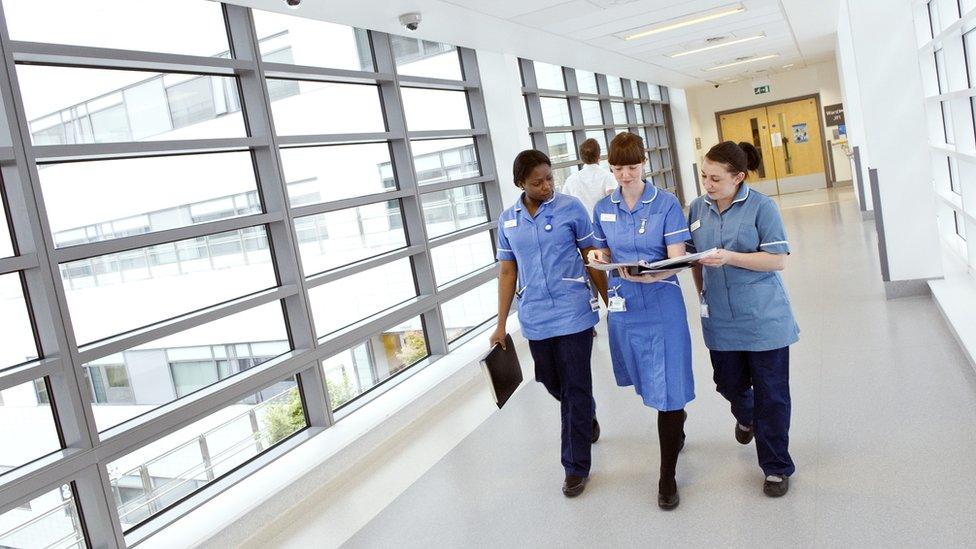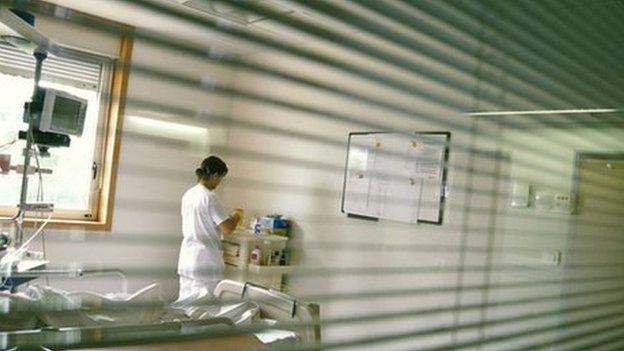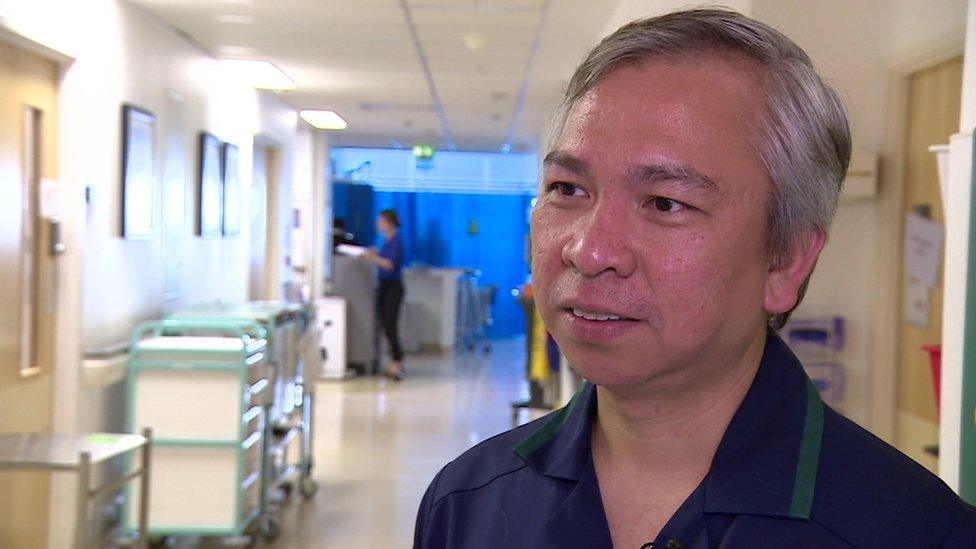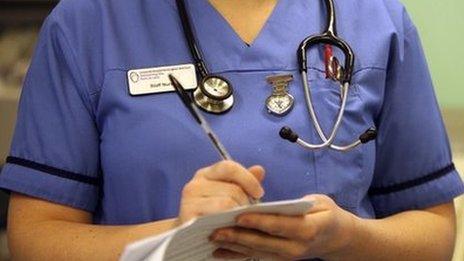Nurses to stage 'summer of protest activity' over pay cap
- Published
"These trusts are in deficit and then to save money, they are not actually filling some of these vacancies" - Janet Davies, RCN
Nurses will stage a "summer of protest activity" across the UK over pay, the Royal College of Nursing has said.
Its members will also be balloted on industrial action unless the next government scraps a 1% pay-rise cap.
It comes as the union says figures suggest the NHS in England is drastically short of the nurses it needs, with 40,000 posts unfilled.
The Conservatives said half the workforce receive annual progression-in-the-job pay rises.
The RCN said a consultative ballot of its members in April showed a majority (78%) were prepared to go on strike, while 91% said they would support industrial action short of a strike. About 52,000 of the 270,000 RCN members eligible to vote took part.
Another ballot would have to be held before any industrial action took place.
'Show of anger'
The union said the 1% cap on pay rises had left nursing staff with a 14% real terms pay cut since 2010 and it would launch a ballot on industrial action this year unless it was lifted.
Michael Brown, chairman of the RCN Council, said: "Our members have given us the very clear message that they can't and won't take any more.
"This is an unprecedented show of anger and frustration over the government's pay policy.
"Politicians must now listen and tell us what they will do about nursing pay. It's a message to all parties that the crisis in nursing recruitment must be put centre stage in this election."

Nurses will be balloted on taking industrial action unless a 1% pay cap is dropped, says the RCN
Mr Brown said the union had never taken industrial action in its 100 year history, so balloting members would be a "significant step".
The total number of nurse vacancies is double what it was in 2013 - and means one in nine positions is now empty, according to the analysis by the RCN.
It said the nurses shortage was dangerous, blaming the stress of working in the NHS and the cap on pay rises for the problem.
The Conservatives have said extra money is being invested to enable ministers to ensure patient safety is prioritised and, despite the vacancies, the number of nurses employed is still rising.
Between 2010 and 2016 the number employed has risen by 2% to just over 300,000 full-time nurses.

Analysis: 'Emotion and anger'
By BBC health correspondent Jane Dreaper:
The debate in the hall was emotional - with some speakers and members of the audience shedding tears.
There was a standing ovation for one man who told of struggling to make ends meet. He became choked while giving his speech after finishing a night shift at a Liverpool hospital.
But away from the emotion and anger so clearly on display here, the union admits it has a lot of work to do in engaging its members - given that only 19% of those eligible took part in this consultation.
The RCN has never previously balloted for industrial action - and the UK's nurses have never staged an all-out strike.

'Dangerous shortages'
The RCN does not dispute this, instead it has looked at how many nurses NHS trusts needed to employ, but cannot.
It relied on freedom of information requests to obtain data from all types of NHS trusts for the end of 2016 and received responses from three-quarters.
They suggested on top of the nurses employed there were another 40,000 posts unfilled across the whole health service.
This equates to a vacancy rate of nearly 12% and compares with a total of 20,000 when the RCN last carried out similar research in 2013.
The RCN research found the vacancy rate was greatest in mental health services where more than 14% of posts were empty, compared with close to 8% in specialist services, such as cancer and heart hospitals.
Official figures in Scotland and Northern Ireland show a much lower vacancy rate at about 4% in each nation. Figures were not available for Wales.
RCN general secretary Janet Davies said the shortages were "dangerous" because they were now risking patient care.
She said the situation could get even worse in future years because the NHS was so reliant on nurses from Europe and numbers could be affected by Brexit.

A nurse's story: 'I need to get out'
Sam (not her real name) has only been working as a nurse for 18 months, but already she is looking to leave the profession.
"The pay is an issue, but it's the pressure that is the key thing. I work in an emergency department and we are constantly understaffed. I should have not more than four or five patients, but it is always more than that. And we rely heavily on agency staff and that puts more pressure on - and I am newly qualified.
"It means I can't provide the safe care I want to. I am rushing from patient to patient. We are having to discharge them before they are ready. It is really upsetting.
"The other week an elderly patient came in from a nursing home, but the doctors could not attend to her. She had a cardiac arrest. I had to perform CPR. I just can't keep working in these conditions. I need to get out."

Liberal Democrat health spokesman Norman Lamb said the number of unfilled posts was a "scandal".
Meanwhile, Labour's shadow health secretary Jon Ashworth described it as "terrible news" for patients.
The Conservatives have argued that the figures put forward on pay ignore the fact that half the workforce receives annual progression-in-the-job rises.
A spokesman said a Labour government would put NHS services at risk because of its bad economic policies.
- Published10 May 2016

- Published15 October 2015

- Published10 September 2015

- Published11 March 2014

- Published14 January 2016
